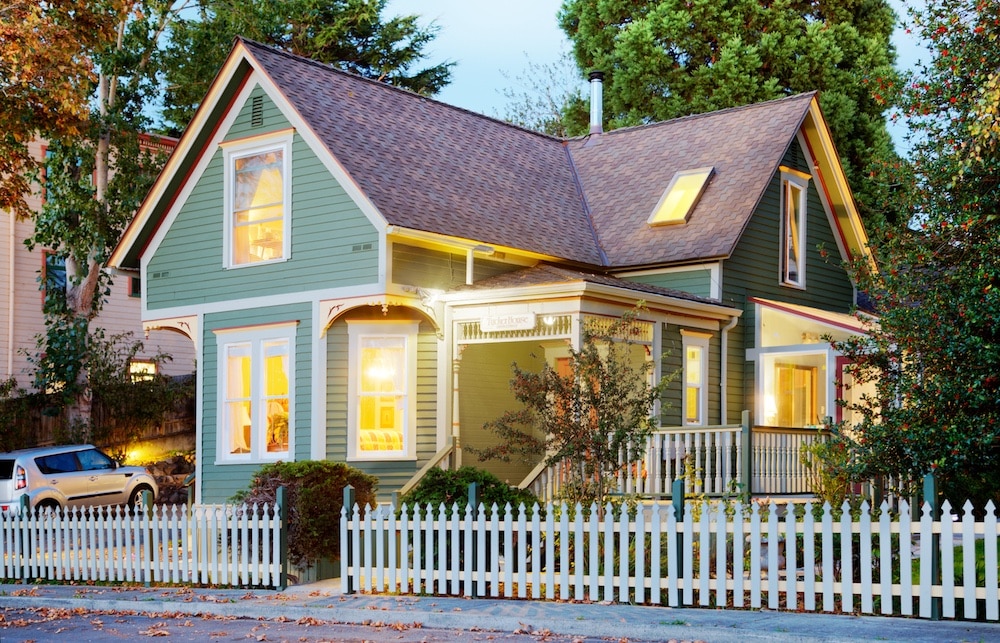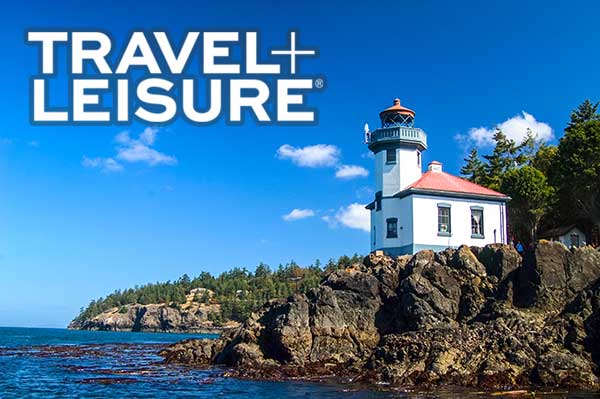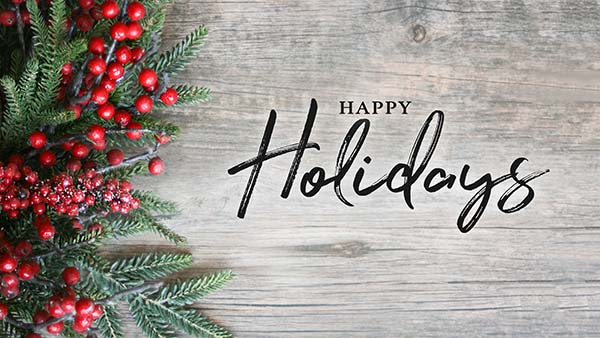-
-
-
-
Housemade & Locally Sourced Ingredients
Gourmet Breakfast Delivered to Your DoorSavor our Food & Wine -
Our Inn
Escape to the Tucker House Inn & Harrison House Suites two of the top-rated Friday Harbor Bed and Breakfasts on San Juan Island. Experience an ideal Pacific Northwest retreat only a short drive from Seattle.
Our 18-unit historic inn has a variety of eco-friendly lodging options that are perfect for couples, families, and four-legged friends. Indulge in our complimentary hot multi-course gourmet breakfasts made from the freshest seasonal ingredients and delivered hot to your door each morning.
Let us pamper you with our inn’s luxurious amenities. Book your authentic island getaway at the Tucker House Inn & Harrison Harrison House Suites in downtown Friday Harbor.
Guest Rooms
The Tucker House Inn’s spacious guest rooms are perfect for couples on a romantic getaway on San Juan Island. Enjoy the comforts of home and the luxuries of our Friday Harbor Bed and Breakfast while relaxing in your jacuzzi tub or curling up by your fireplace with our complimentary snacks.
Let our innkeepers help you find the perfect guest room for your island getaway. Book directly to get the best rates.
Cottages & Suites
The Harrison House Suites’ fully-appointed cottages and Bed and Breakfast suites accommodate up to ten. All cottages and suites are pet and family-friendly. Offering comfort and privacy, our accommodations are individually designed in a relaxed decor with fully-stocked kitchens and views of Friday Harbor.
Start your day with our gourmet breakfast delivered to your room and end it by relaxing in your private hot tub. Let our innkeepers help you find the perfect cottage or suite for your group’s island getaway. Book directly to get the best rates.
Getaway Packages & Specials
Celebrating a special occasion? Whether it’s an anniversary, family reunion, honeymoon, or babymoon, dream your ideal San Juan Island getaway and we’ll make it happen. Pamper your loved ones and your pets with gourmet foods from Coho Restaurant, local wines, and cooking classes.
We offer discounts for longer stays and to our valued return guests. Call us to create your custom package.
Coho Restaurant
After a day exploring Friday Harbor, slow down and enjoy a farm-to-table fine dining experience at Coho Restaurant. Our culinary team showcases the flavors of the San Juan Islands with locally sourced fresh ingredients.
Coho Restaurant’s award-winning wine cellar features local wines along with a curated selection of library and international wines, expertly paired to complement the food.
Weddings & Events
San Juan Island is the perfect destination for your special event including weddings, family reunions, and corporate retreats. We offer in-house event planning, catering provided by Coho Restaurant, and travel services.
Whether your vision is a private elopement, an intimate wedding, or a large celebration with family and friends, the Tucker House Inn & Harrison House Suites will make the magic happen. Contact our wedding and events planner to explore all your special occasion options.
The San Juan Islands
The Tucker House Inn & Harrison House Suites are an ideal base to explore the San Juan Islands. Located two blocks from Friday Harbor’s ferry terminal and historic downtown, the inn is just steps away from whale watching expeditions, outdoor adventures, and eclectic shops.
Observe whales year round in their natural habitat for the experience of a lifetime. Visit local farms, art museums, and historic sites. Relish in the natural beauty of the islands hiking, biking, and kayaking with our complimentary outdoor equipment. Call our concierge to arrange your island adventure.
Gift Shop
Relive your time in the San Juan Islands or share a memory of your stay with those back home with selections from our gift shop. We offer our freshly made treats from local ingredients including our granola, dog biscuits, and hot chocolate. Take home our handcrafted spa amenities, including soaps, lotions, and custom-scented bath and shower products.
Delight your loved ones with an island experience with a Tucker House Inn & Harrison House Suites gift certificate.
From Our Best of The San Juan Islands Blog
This chic and spacious jute bag serves multiple purposes, making it a fantastic addition to your home for storage and decoration, a reusable shopping companion, or a stylish gym tote. Consider treating yourself to our foodie bag or pampering bag, which also make wonderful gifts for the holiday season!
#fridayharborwa #VisitSanJuan #happyholidays #fridayharbor #giftbags #holidayshopping #giftgiving #PNWLiving

This chic and spacious jute bag serves multiple purposes, making it a fantastic addition to your home for storage and decoration, a reusable shopping companion, or a stylish gym tote. Consider treating yourself to our foodie bag or pampering bag, which also make wonderful gifts for the holiday season!
#fridayharborwa #VisitSanJuan #happyholidays #fridayharbor #giftbags #holidayshopping #giftgiving #PNWLiving
...
We’re all set and excited to greet you this holiday season! Your cozy getaway is ready—reserve your holiday escape today! 🎄 🌟
https://tinyurl.com/yc5a2v4u
#holidaygetaway #fridayharbor #visitsanjuan #bucketlist #bedandbreakfast #happyholidays #decoracion #christmastree #fridayharborwa #vacationtime

We’re all set and excited to greet you this holiday season! Your cozy getaway is ready—reserve your holiday escape today! 🎄 🌟
https://tinyurl.com/yc5a2v4u
#holidaygetaway #fridayharbor #visitsanjuan #bucketlist #bedandbreakfast #happyholidays #decoracion #christmastree #fridayharborwa #vacationtime
...
Drew and Jonathan Scott from Property Brothers featured us in their blog! They shared insights on what to do and where to stay on the island, and we are thrilled to be recognized. It’s truly an honor!
https://www.drewandjonathan.com/living/best-underrated-summer-travel-ideas/
#fridayharborwashington #vacationtime #bedandbreakfast #vacation #sanjuanisland #VisitSanJuan

Drew and Jonathan Scott from Property Brothers featured us in their blog! They shared insights on what to do and where to stay on the island, and we are thrilled to be recognized. It’s truly an honor!
https://www.drewandjonathan.com/living/best-underrated-summer-travel-ideas/
#fridayharborwashington #vacationtime #bedandbreakfast #vacation #sanjuanisland #VisitSanJuan
...
Dine, Drink, And Dream! ✨
Experience an unforgettable evening by enjoying a delightful dinner at Coho Restaurant, followed by a relaxing stay at the Tucker House Inn for just $169. Located only a block and a half from the restaurant, the inn offers a cozy retreat that feels like home. This special rate applies to double occupancy in one of our queen guest rooms featuring a jetted tub, providing the perfect setting for a romantic getaway. Please note that this offer is not valid for existing reservations. Good for the date listed only; additional nights available at the standard rate.
#fridayharborwashington #vacationtime #autumn #VisitSanJuan #vacation #sanjuanisland #islandlife #bedandbreakfast #finediningrestaurant #WineDinnerExperience #winemakerdinner #special

Dine, Drink, And Dream! ✨
Experience an unforgettable evening by enjoying a delightful dinner at Coho Restaurant, followed by a relaxing stay at the Tucker House Inn for just $169. Located only a block and a half from the restaurant, the inn offers a cozy retreat that feels like home. This special rate applies to double occupancy in one of our queen guest rooms featuring a jetted tub, providing the perfect setting for a romantic getaway. Please note that this offer is not valid for existing reservations. Good for the date listed only; additional nights available at the standard rate.
#fridayharborwashington #vacationtime #autumn #VisitSanJuan #vacation #sanjuanisland #islandlife #bedandbreakfast #finediningrestaurant #WineDinnerExperience #winemakerdinner #special
...
The highlight of being an innkeeper is definitely reading the all wonderful comments from our fantastic guests! 🤗
#fridayharborwashington #vacationtime #bedandbreakfast #autumn #vacation #sanjuanisland #VisitSanJuan #guests #happyguests

The highlight of being an innkeeper is definitely reading the all wonderful comments from our fantastic guests! 🤗
#fridayharborwashington #vacationtime #bedandbreakfast #autumn #vacation #sanjuanisland #VisitSanJuan #guests #happyguests
...
We were truly thrilled to be part of your special day, Bailey and Seth. You both, along with your family, are simply wonderful. We look forward to celebrating many anniversaries with you in the future!
#justsayido #visitsanjuan #fridayharbor #destinationwedding #islandlife #pnw #bucketlist #tuckerhouseinn

We were truly thrilled to be part of your special day, Bailey and Seth. You both, along with your family, are simply wonderful. We look forward to celebrating many anniversaries with you in the future!
#justsayido #visitsanjuan #fridayharbor #destinationwedding #islandlife #pnw #bucketlist #tuckerhouseinn
...
This article offers a captivating exploration of the benefits of unplugging in nature. Journalist Allison embarks on a kayaking adventure with Outdoor Odyssey in San Juan, where participants can enjoy a unique digital detox: a 10% refund for leaving their phones in the van for the entire six-hour trip. Research indicates that reduced phone usage enhances attention spans and promotes better mental health. At the Inn, we wholeheartedly support the idea of disconnecting! Our Unplugged on the San Juan package features a one-hour studio class, a soothing hour-long massage, and a delightful chef’s tasting experience. Come to San Juan, disconnect, and immerse yourself in the island’s natural beauty.
https://www.seattlemet.com/travel-and-outdoors/2025/09/kayaking-unplugging-oudoors
https://www.outdoorodysseys.com
https://tuckerharrisoninn.com/san-juan-islands-getaway-packages-and-specials/
#vacationtime #summer2026travel #vacationtime #VisitSanJuan #kayaking #unplugged #pnw #vacation #bucketlist #kayakingadventures

This article offers a captivating exploration of the benefits of unplugging in nature. Journalist Allison embarks on a kayaking adventure with Outdoor Odyssey in San Juan, where participants can enjoy a unique digital detox: a 10% refund for leaving their phones in the van for the entire six-hour trip. Research indicates that reduced phone usage enhances attention spans and promotes better mental health. At the Inn, we wholeheartedly support the idea of disconnecting! Our Unplugged on the San Juan package features a one-hour studio class, a soothing hour-long massage, and a delightful chef’s tasting experience. Come to San Juan, disconnect, and immerse yourself in the island’s natural beauty.
https://www.seattlemet.com/travel-and-outdoors/2025/09/kayaking-unplugging-oudoors
https://www.outdoorodysseys.com
https://tuckerharrisoninn.com/san-juan-islands-getaway-packages-and-specials/
#vacationtime #summer2026travel #vacationtime #VisitSanJuan #kayaking #unplugged #pnw #vacation #bucketlist #kayakingadventures
...
Are you already planning your next summer getaway? Consider an extraordinary experience that many dream of: kayaking through the bioluminescent waters of San Juan Island. As you paddle under the night sky, the shimmering sea sparkles and glowing jellyfish create a magical atmosphere, transforming your adventure into something truly unforgettable. San Juan Island was named in Lonely Planet’s 2024 list of best places for bioluminescent viewing in the world, making it an opportunity you won’t want to miss! The ideal time to visit is between May and August.
https://seattlemag.com/outside/kayaking-the-bioluminescent-waters-of-san-juan-island/
@lonelyplanet @seattlemag
PHOTO BY AHMED NISHAATH / UNSPLASH
#vacationtime #tuckerhouseinn #VisitSanJuan #pnw #vacation #bioluminescencekayaking #Bioluminescence #summer2026travel #kayakingadventures #bucketlist

Are you already planning your next summer getaway? Consider an extraordinary experience that many dream of: kayaking through the bioluminescent waters of San Juan Island. As you paddle under the night sky, the shimmering sea sparkles and glowing jellyfish create a magical atmosphere, transforming your adventure into something truly unforgettable. San Juan Island was named in Lonely Planet’s 2024 list of best places for bioluminescent viewing in the world, making it an opportunity you won’t want to miss! The ideal time to visit is between May and August.
https://seattlemag.com/outside/kayaking-the-bioluminescent-waters-of-san-juan-island/
@lonelyplanet @seattlemag
PHOTO BY AHMED NISHAATH / UNSPLASH
#vacationtime #tuckerhouseinn #VisitSanJuan #pnw #vacation #bioluminescencekayaking #Bioluminescence #summer2026travel #kayakingadventures #bucketlist
...





